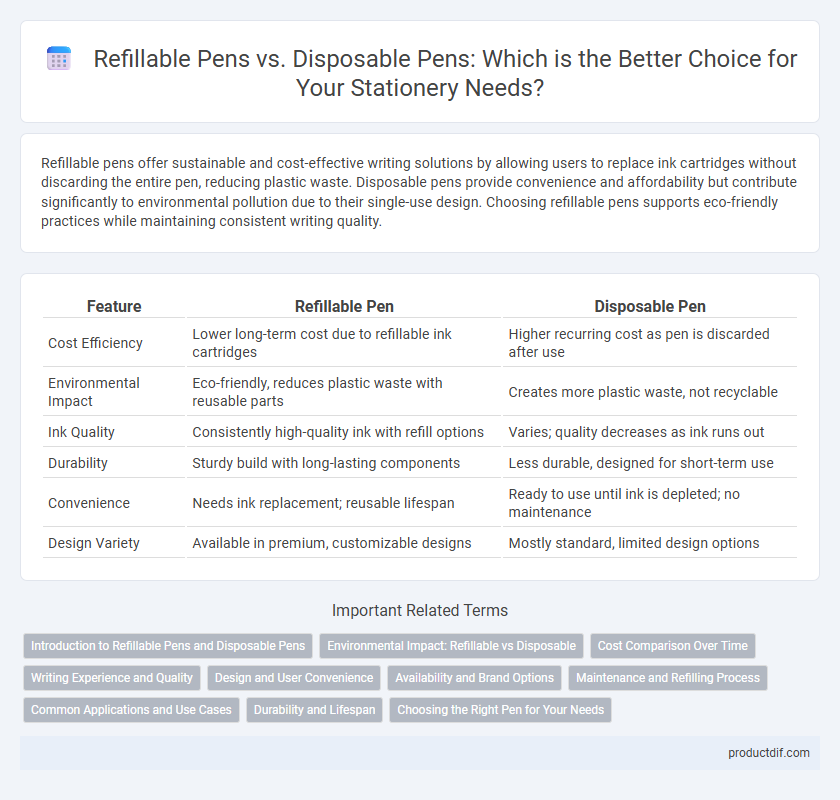Refillable pens offer sustainable and cost-effective writing solutions by allowing users to replace ink cartridges without discarding the entire pen, reducing plastic waste. Disposable pens provide convenience and affordability but contribute significantly to environmental pollution due to their single-use design. Choosing refillable pens supports eco-friendly practices while maintaining consistent writing quality.
Table of Comparison
| Feature | Refillable Pen | Disposable Pen |
|---|---|---|
| Cost Efficiency | Lower long-term cost due to refillable ink cartridges | Higher recurring cost as pen is discarded after use |
| Environmental Impact | Eco-friendly, reduces plastic waste with reusable parts | Creates more plastic waste, not recyclable |
| Ink Quality | Consistently high-quality ink with refill options | Varies; quality decreases as ink runs out |
| Durability | Sturdy build with long-lasting components | Less durable, designed for short-term use |
| Convenience | Needs ink replacement; reusable lifespan | Ready to use until ink is depleted; no maintenance |
| Design Variety | Available in premium, customizable designs | Mostly standard, limited design options |
Introduction to Refillable Pens and Disposable Pens
Refillable pens feature durable bodies designed for repeated ink cartridge replacements, reducing waste and offering long-term cost efficiency. Disposable pens come pre-filled with ink and are intended for short-term use, making them convenient but environmentally less sustainable. Choosing between refillable and disposable options depends on factors like usage frequency, environmental impact, and budget considerations.
Environmental Impact: Refillable vs Disposable
Refillable pens significantly reduce environmental impact by minimizing plastic waste and lowering the demand for raw materials compared to disposable pens. Disposable pens contribute to landfill accumulation and pollution due to their single-use design and non-recyclable components. Choosing refillable pens promotes sustainability through extended use and decreased resource consumption in the stationery industry.
Cost Comparison Over Time
Refillable pens have a higher initial cost but offer significant savings over time as only ink refills are needed, reducing waste and purchase frequency. Disposable pens are cheaper upfront but accumulate higher expenses due to constant replacement and limited lifespan. Businesses aiming for cost efficiency and sustainability find refillable pens more economical in the long run.
Writing Experience and Quality
Refillable pens offer a superior writing experience with smoother ink flow and consistent line quality, enhancing precision and comfort for prolonged use. Disposable pens often sacrifice ink richness and reliability, resulting in uneven strokes and a less comfortable grip during extended writing sessions. Quality materials in refillable pens contribute to durability and a balanced feel, making them preferable for users who prioritize performance and sustainability.
Design and User Convenience
Refillable pens feature durable designs with replaceable ink cartridges, offering long-term cost efficiency and environmental benefits compared to disposable pens. Their ergonomic build often includes balanced weight and grip options that enhance comfort during extended use. Disposable pens, while lightweight and convenient for short-term tasks, lack customization and sustainability found in refillable alternatives.
Availability and Brand Options
Refillable pens offer a wide range of availability, with top brands like Parker, Lamy, and Pilot providing numerous refill options that support sustainability and long-term use. Disposable pens are ubiquitously available from brands such as Bic, Paper Mate, and Zebra, often found in bulk quantities and convenience stores for quick, cost-effective use. Brand diversity in refillable pens emphasizes quality and eco-friendliness, while disposable pens prioritize accessibility and affordability across various retail channels.
Maintenance and Refilling Process
Refillable pens offer a sustainable option with easy maintenance through replaceable ink cartridges or converters, reducing long-term costs and environmental impact. Disposable pens require no upkeep but generate more waste due to limited lifespan and non-reusable components. The refilling process for refillable pens is straightforward and involves minimal tools, whereas disposable pens necessitate full replacement once ink is depleted.
Common Applications and Use Cases
Refillable pens are widely preferred in professional and academic settings due to their cost-effectiveness and environmental benefits, making them ideal for daily extensive writing tasks and signature-heavy professions. Disposable pens are commonly used for quick notes, events, and promotional giveaways where convenience and immediate availability outweigh longevity. Both types serve educational environments, with refillable pens favored for sustained study sessions while disposable pens support temporary usage like exams or short-term projects.
Durability and Lifespan
Refillable pens offer superior durability with components designed for long-term use, often lasting years with proper maintenance, while disposable pens typically last only until the ink runs out. The lifespan of refillable pens is extended by replaceable ink cartridges, reducing waste and ensuring consistent writing performance over time. Disposable pens, though convenient, have a limited lifespan and tend to wear out quickly due to lower-quality materials and non-replaceable ink supply.
Choosing the Right Pen for Your Needs
Refillable pens offer long-term cost savings and environmental benefits by allowing users to replace ink cartridges rather than discarding the entire pen, making them ideal for frequent writers seeking durability and sustainability. Disposable pens provide convenience and affordability for occasional use or on-the-go situations, with no maintenance required after the ink runs out. Evaluating frequency of use, budget, and environmental impact helps determine whether a refillable or disposable pen best suits individual writing needs.
Refillable Pen vs Disposable Pen Infographic

 productdif.com
productdif.com